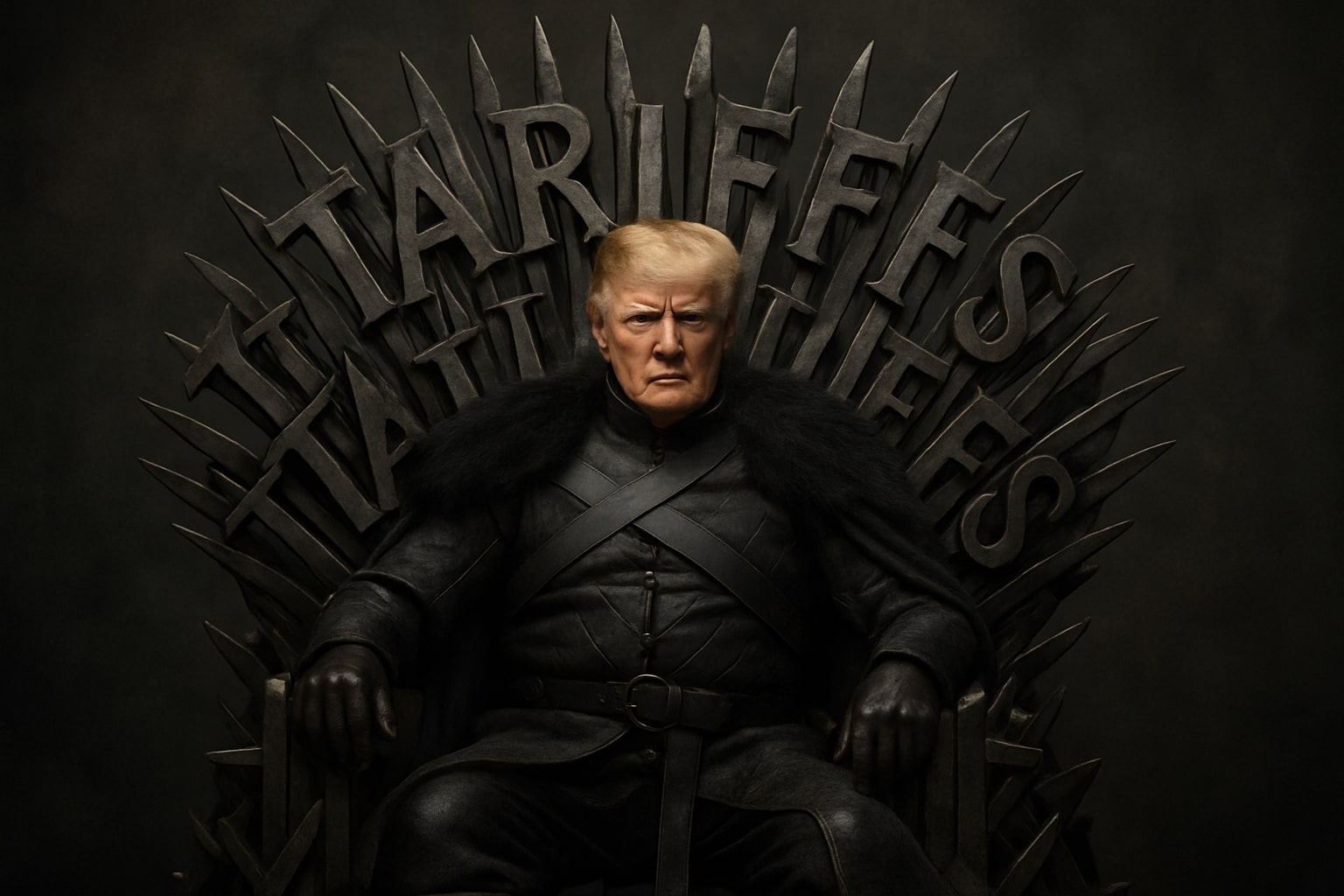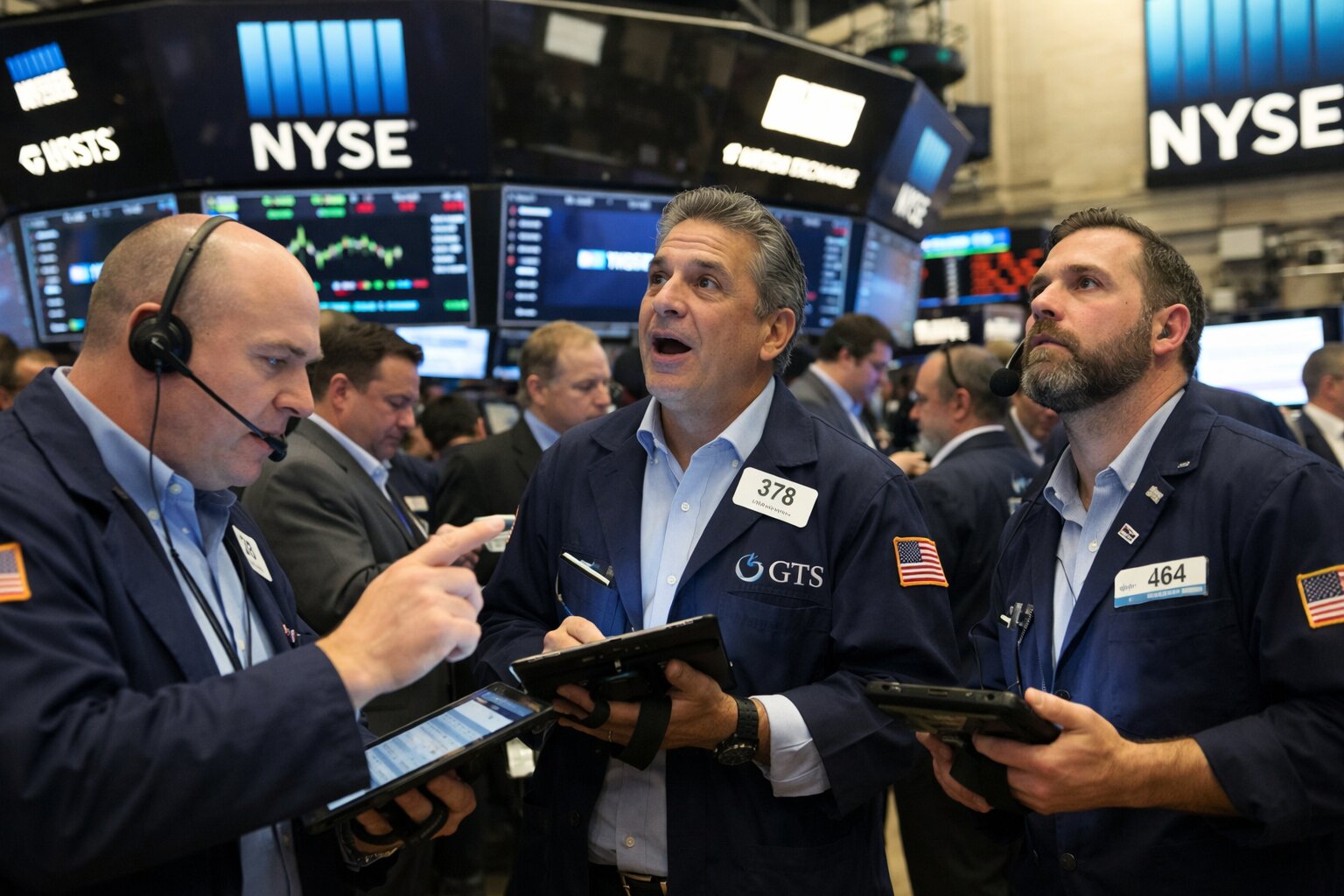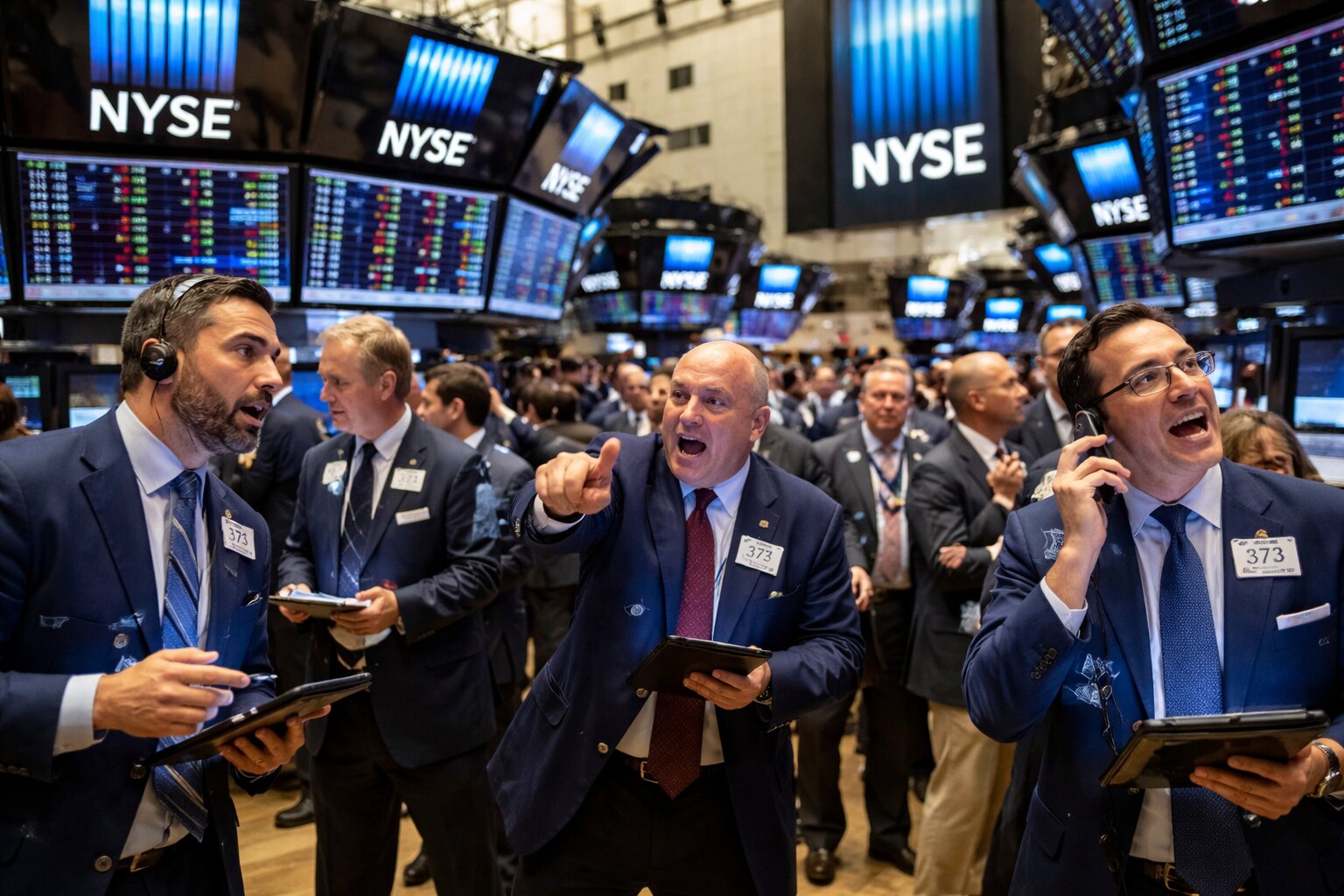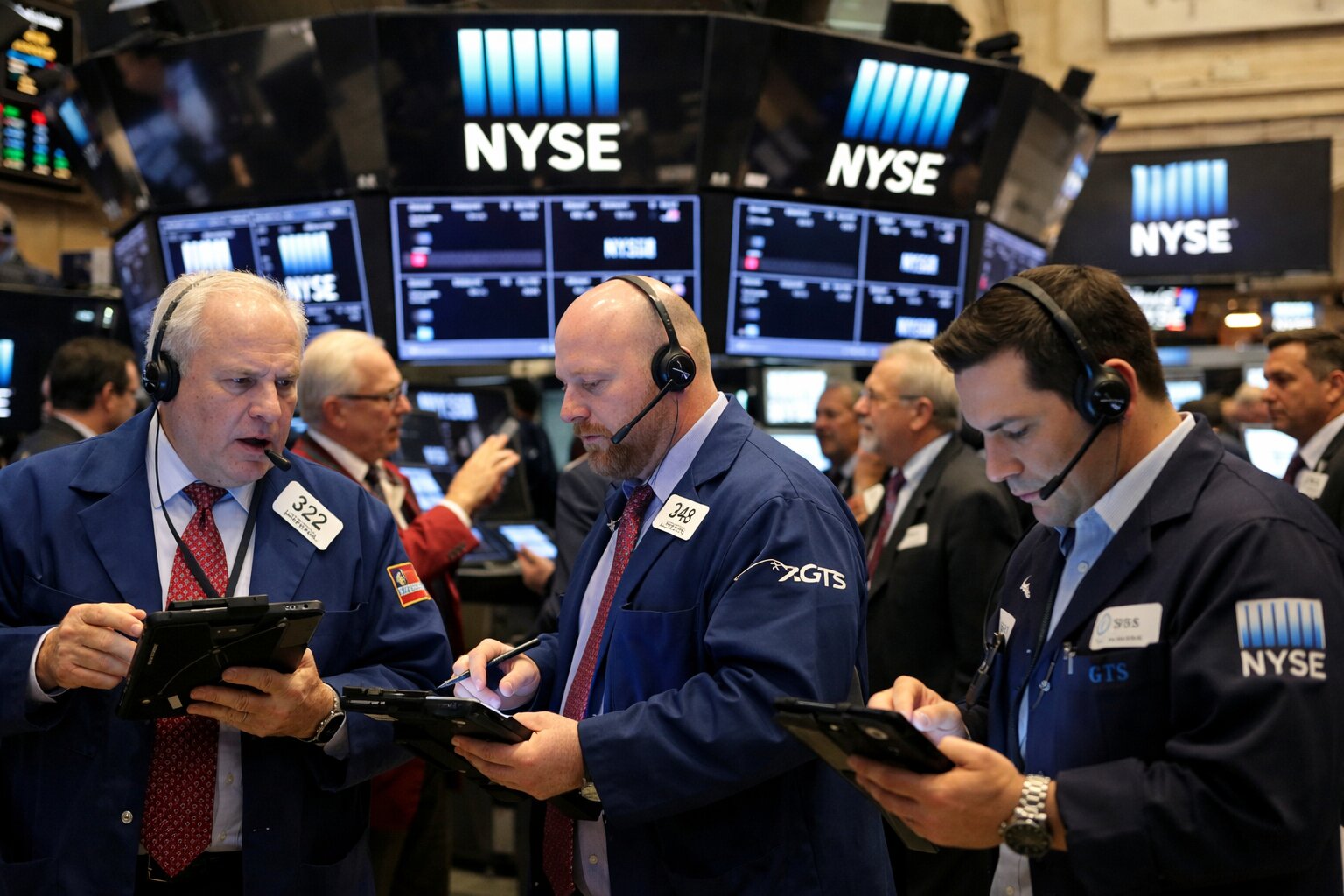
US Markets React to Trump’s Growing Trade War: Dow Drops 200+ Points as Tariffs Set to Escalate
As President Trump signals further tariff hikes, Dow futures fall 218 points, S&P 500 drops 44, and Nasdaq plunges by 221 points. Will global trade tensions, including a $113 billion EU tariff threat, send markets into deeper losses? | That's TradingNEWS
Current Market Trends Amid Trump’s Tariff Plans
The US stock market is facing fresh turmoil as President Trump hints at even more aggressive tariffs, pushing stocks lower. The Dow Jones Industrial Average fell sharply, down 218.6 points (0.5%) at 41,000.19, while the S&P 500 dropped 44.5 points (0.8%) to 5,605.87. The Nasdaq Composite took the hardest hit, tumbling 221 points (1.2%) to 17,623.21. This market downturn follows Trump’s warnings of impending tariffs on a wide range of goods, including pharmaceuticals and critical minerals, which could negatively affect the US economy and worsen trade relations globally.
The EU’s response to Trump’s tariffs has been clear: they are preparing to retaliate with their own set of tariffs, potentially targeting $113 billion worth of US goods. This move would add to the existing tariffs that have already strained relations between the US and the EU, especially after the US imposed a 25% tariff on steel and aluminum. If these new tariffs are implemented, it could cover 97% of EU-US trade, significantly impacting industries like automotive, pharmaceuticals, and agriculture, which are heavily reliant on transatlantic trade.
Meanwhile, companies are bracing for the financial fallout. For instance, Ford (F) warned of a $1.5 billion hit to its 2025 earnings due to the impact of these tariffs. The automaker has already been under pressure, with tariff-induced price hikes on auto parts affecting its supply chain. Similarly, Mattel (MAT) announced that it would likely raise prices on US-bound products as the tariffs added $270 million in costs. The company, which imports 20% of its products from China, is facing a bleak forecast as the tariff landscape remains volatile.
Global Trade Reactions: EU’s Retaliatory Tariffs and China’s Stand
On the global stage, Canada is feeling the pressure too, with its trade deficit shrinking due to retaliatory tariffs on US goods. Canada's trade deficit narrowed to C$506 million in March, better than expected, as the nation’s tariffs took effect. President Trump has been vocal about his stance on tariffs, even pushing for a 100% tariff on foreign-made movies, a move that has already affected shares in companies like Netflix (NFLX) and Warner Bros. Discovery (WBD), which saw their stock prices dip by 4% and 2% respectively.
The EU’s response to Trump’s tariffs cannot be ignored. With the European Commission warning of additional tariffs, it’s clear that the situation is escalating. If trade talks collapse, the EU is prepared to hit back hard, implementing tariffs on everything from automobiles to chemicals, exacerbating the already volatile situation. According to the EU trade commissioner, the bloc does not feel pressured into accepting unfair trade deals, with tariffs now covering 70% of EU-US trade. This number is expected to rise significantly as the US prepares for further tariffs in the coming months.
Surging Pharmaceutical Imports as Companies Brace for Tariffs
At the same time, US pharmaceutical imports surged as companies rushed to stockpile goods ahead of potential tariff hikes. The value of pharmaceutical imports jumped from $20.9 billion in March to $50.4 billion, a doubled value. This surge highlights how Trump’s tariffs are already disrupting supply chains, with some industries anticipating sharp price increases.
Impact on M&A Activity and Investment Decisions
The ongoing uncertainty surrounding tariffs has also led to a drastic drop in M&A activity, with the number of deals signed in April falling to a 20-year low. This decline can be attributed to the unpredictability of Trump's tariff policies, as companies across the globe hesitate to make long-term investments amidst such instability. The lack of clarity on future trade agreements has many executives sitting on the sidelines, waiting for more stable economic conditions before making decisions on mergers or acquisitions.
Economic Pressure from Trump’s Tariffs: Impact on Small Businesses
In light of these developments, investors and businesses are grappling with the unpredictable nature of Trump’s trade policies. Even billionaire investor Bill Ackman weighed in, suggesting that the US should pause China tariffs for six months to stabilize the economy and improve the chances of reaching a trade agreement. This temporary suspension could relieve some of the pressure on the US economy, but until then, the uncertainty surrounding tariffs will continue to weigh heavily on the market.
The Future of US Trade: Will Trump’s Tariff Policies Lead to Recovery or Continued Decline?
Will this economic uncertainty create further market losses, or will negotiations lead to a reduction in tariffs and a rebound in trade relations? The current trend suggests more volatility ahead as Trump’s tariff plans continue to send shockwaves through the stock market. With key sectors like pharmaceuticals, automobiles, and technology feeling the pinch, it remains to be seen how deep the impact will go, but investors must brace for further turbulence.
That's TradingNEWS
Read More
-
GPIQ ETF Price Forecast: Can a 10% Yield at $52 Survive the Next Nasdaq Selloff?
09.02.2026 · TradingNEWS ArchiveStocks
-
XRP ETF Price Forecast: XRPI at $8.32, XRPR at $11.86 as $44.95M Inflows Defy BTC and ETH Outflows
09.02.2026 · TradingNEWS ArchiveCrypto
-
Natural Gas Futures Price Forecast: Will The $3.00 Floor Hold After The $7 Winter Spike?
09.02.2026 · TradingNEWS ArchiveCommodities
-
Stock Market Today: Dow Back Under 50K While S&P 500 and Nasdaq Push Higher as Gold Reclaims $5,000
09.02.2026 · TradingNEWS ArchiveMarkets
-
USD/JPY Price Forecast: Can Bulls Clear 157.5 Without Triggering a 160 Intervention Line?
09.02.2026 · TradingNEWS ArchiveForex



















